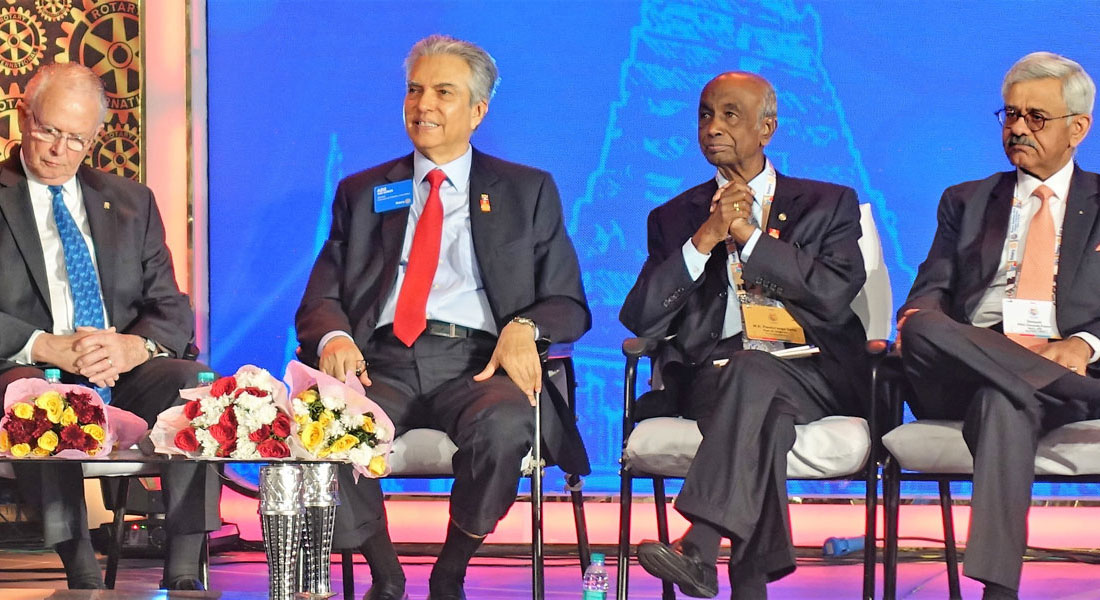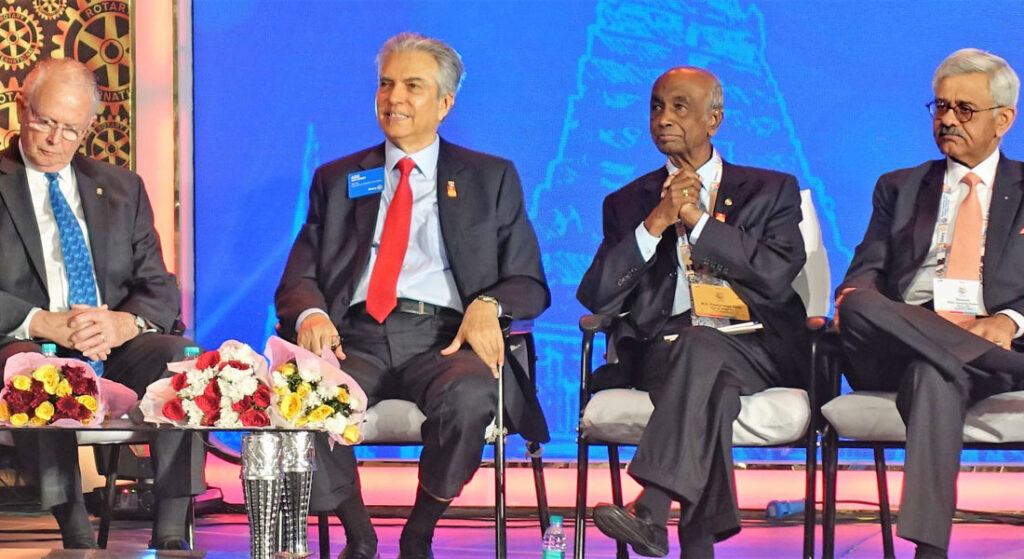
As the entire Rotary world looks forward to eliminating the last cases of Polio from Afghanistan and Pakistan, at the Chennai Institute, PDG Aziz Memon, Pakistan National PolioPlus Committee Chair, had a bit of cheerful news to share. “Let’s look at the provinces in the FATA (Federally Administered Tribal Areas) area of Pakistan, which is a mountainous region where the Taliban is stationed, and when Pakistan once had 306 cases of polio, 182 came from FATA alone. But in the last two years, not a single polio case has been reported from FATA.”
Even looking at the overall picture in both the countries of Afghanistan and Pakistan, “we have progressed from 306 cases in 2013–14 to only 19 (unfortunately last evening one more case was reported from Afghanistan) this year — four from Pakistan and 15 from Afghanistan,” he said, addressing a session on Polio Update in Pakistan and Afghanistan.
One of their bigger challenges was Karachi, a city of 23 million people, with so many slums and very poor hygiene, lack of clean drinking water. “We’ve done a good job here also and in the last 20 months we’ve not seen any case of polio from Karachi.”
Even last year, Pakistan had reported eight cases, but these have come down to four in 2018. While Afghanistan had reported 15 cases, “in Nigeria, the good news is there has been no new case for more than two years, and they should be done very soon, as there have been improvements in routine immunisation in Nigeria.”
Returning to Pakistan, Memon said that in one NID, 37.7 million children are vaccinated, using social mobilisers and vaccinators. Earlier the polio vaccinators were hired on a daily wage of ₹250; this has now been changed to local community-based volunteers, who now get a monthly wage of ₹15,000. This has made a difference and now all the high-risk areas of Pakistan have got local community-based volunteers.”
Rotary-Government partnership
In their polio eradication drive Pakistani Rotarians work in close partnership with the Government. Displaying a picture of Pakistan Prime Minister Imran Khan giving polio drops some 18 months ago to a child in the Khyber Pakhtunkhwa region of Pakistan, where his party was then in power, Memon said, “Even now we are in touch with him; we have started interacting with the new political leadership and I can assure you they are fully on board and we are all resolved and motivated that polio should be eradicated totally from Pakistan.”
With the “guidance of PRID Ashok Mahajan, we have created an Ulema committee which meets regularly, and we do workshops for them so they can address the community. I can tell you that the refusals to immunise their children have come down drastically. And where there are refusals, they are on the grounds that we have no drinking water, we have no electricity, there is filth and dirt everywhere, etc, and we try to help there also. But chronic refusals are no longer there thanks to the work of the Ulema committee.”
Partnership with Coke
Among the partnerships Rotary is striking with corporates, very successful has been one with Coca Cola, which has put up water filtration plants to provide safe drinking water to 20,000 families. “This is making miracles and the press release for the last plant inaugural we sent was picked up by 32 newspapers and the headline was ‘Rotary Coke partnership provides drinking water’. This is helping Rotary’s public image also.”
Memon added that at the Pak-
Afghan border which has all the difficult transit points, “we have put up a Rotary transit post for polio immunisation wherever there is an army or police post to check the buses. Last year we got evaluation done by an independent body and found that 3.5 million children were given OPV at the Rotary-provided polio transit posts.”
The problem in Afghanistan was that the polio cases were reported from areas such as Kandahar, which had a huge security issue, and in one particular corridor, in the last seven months no child had been able to get a single drop of polio vaccine. Even the most recent case had been reported from Kandahar, and that made a total of 10 cases from Kandahar alone.
“Whenever there is a case reported from the Afghan border it sends alarm bells ringing for us because we have a 2,450-km porous border with Afghanistan, where a lot of movement takes place, so reaching every child moving from one to the other country is a tough task,” he added.
Memon concluded by saying that so far 187 vaccinators have been killed in Pakistan, the last being in Jan 2018. “Outside Quetta, Sakina (40) and her daughter (15) were shot at and they died instantly. Sakina comes from the poorest of poor families, her husband is a taxi driver, and has left behind five children, the youngest only nine months old. We immediately gave the first cheque for ₹5,000. Later with help from other donors we got the family a house.”
He added that PRIP K R Ravindran had visited Pakistan during his presidency and suggested that once Rotary was done with polio, these vaccinators will be forgotten, so something concrete should be done. So five scholarships in public health titled Rotary PolioPlus Memorial scholarships have been set up to benefit the community.
In his address, which due to lack of time was curtailed to 10 minutes, INPPC Chair Deepak Kapur wondered how he would sum up the story of “three decades’ struggle, disappointments, achievements and success” in 10 minutes. But it would take less than 10 minutes to demolish the work done by Rotarians and others by an entity called the media which could spread misinformation about the return of polio to India, as had happened in early October.
One thought he left the audience with was: “Every 10 minutes, Rajashree Birla contributes over ₹1,700, and has done so through the years, year after year, till the corpus has added up to over $12 million.”
Picture by Rasheeda Bhagat







